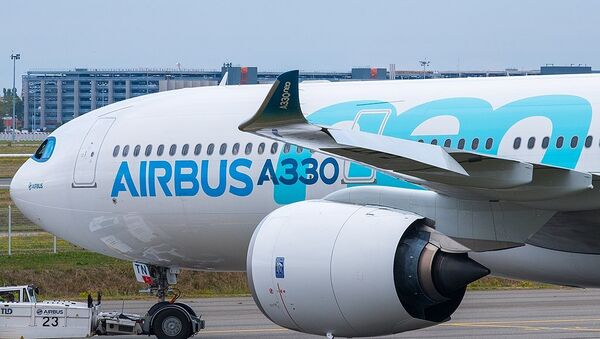Kristian Rouz – The government of the East African nation of Tanzania says it plans to purchase two new Airbus jets, as well as one aircraft from De Havilland Canada for its state-owned airline.
The announcement comes amid a dispute between the World Bank and the Tanzanian finance ministry over the nation's GDP growth rate, as well as a discussion about whether the nation can afford the new jets.
According to the Office of the President of Tanzania, President John Magufuli has come up with a personal plan to revive the nation's state-owned carrier Air Tanzania Company Limited (ATCL).
Three more new aircrafts coming, Magufuli reveals https://t.co/tnOKBuF2gz pic.twitter.com/BKrlnyoOB9
— The Citizen Tanzania (@TheCitizenTZ) July 20, 2019
The country has already spent tens of millions of dollars to buy at least eight new planes since 2016, and the new purchases are expected to cement Air Tanzania's role as leading regional airline in East Africa.
"(Magufuli) has already issued instructions for the purchase of three additional planes (two Airbus jets and one De Havilland) to expand air services and improve tourism," the president's office said in a statement.
Officials did not disclose the price of its new purchases, stirring the speculation the decision could hurt Tanzania's budget.
Meanwhile, the World Bank said in a recent statement that Tanzania's economy had expanded by only 5.2 per cent last year, contradicting an earlier assessment made by the nation's finance minister, who told parliament last month that Tanzania's GDP had risen by 7 per cent in 2018.
The #WorldBank today said Tanzania’s economy grew by 5.2 per cent in 2018, contradicting the 7 per cent growth figure announced by the government of #Tanzania in June 2019... READ MORE here https://t.co/0i26jdOrTp pic.twitter.com/fTamYneG96
— The Citizen Tanzania (@TheCitizenTZ) July 18, 2019
World Bank experts say Tanzania is experiencing an ongoing decline in business investment, exports and commercial bank lending, which could all contribute to a decline in business activity and a further slowdown in the pace of economic expansion.
Weaker business activity also means a smaller tax base, which could impair Tanzania's fiscal revenues going forward. This, in turn, could lead to possible international credit rating downgrades- and buying new planes using taxpayer money is seen as a risky decision.
"Data related to consumption, investment and net trade suggest that growth softened in 2018," World Bank experts said in a report.
Air Tanzania currently has one Boeing 787-8 Dreamliner, two Airbus A220-300s, and three DHC Dash 8-400 planes. The state-owned company launched regular commercial flights to India's financial hub Mumbai last week and hopes to expand to reach new destinations.
Tanzania's Dreamliner is on its maiden trip to Mumbai, India as I post; a direct flight that will take only 5 hours & 20 minutes. pic.twitter.com/bNfNYQ0lUZ
— TanzaniaSpokesperson (@TZSpokesperson) July 17, 2019
The nation's government believes the decision to buy new planes could provide further momentum to the tourism and hospitality industry, which expanded by 7 per cent last year – above the World Bank's GD reading. Tourism is also Tanzania's main source of hard currency revenue.
However, the correlation between Air Tanzania's flights and a rise in tourism appears to be elastic, as international airlines are still bringing the lion's share of tourists into the country. In this light, the possible benefits of the costly decision to buy new jets have been deemed elusive.
Tanzania boosts efforts to screen Ebola at airports https://t.co/iGlEszJf8I pic.twitter.com/Hm4cEUdqc2
— The Citizen Tanzania (@TheCitizenTZ) July 20, 2019
While the 7-per cent rise in tourism brought some $2.4 bln into the country last year, growth in Tanzania's private sector lending slowed to 4 per cent over the same period – compared to 20-per cent annual expansion in the mid-2010s.
The International Monetary Fund (IMF) has also raised questions regarding the sustainability of Tanzania's economy going forward, saying President Magufuli’s policies could reduce private-sector competition, lead to the formation of state-owned monopolies, and, as a result, produce slower GDP expansion for years to come.
IMF officials say Magufuli’s policies are 'unpredictable and interventionist', and the decision to buy new planes may be characterised as such as well.
Tanzania Blocks IMF Report Release as Economic Growth Slows https://t.co/WugN0RqLur
— Ismail Jussa (@IsmailJussa) April 18, 2019
Tanzania's foreign trade deficit increased to 5.2 per cent of its GDP between January 2018 and January 2019, compared to a 3.2-per cent deficit a year prior. Tanzania's exports dropped 4 per cent, while imports rose 7.8 per cent. A purchase of new jets is now widely expected to exacerbate the nation's poor foreign trade performance this year.
The IMF has recommended that Tanzania boost the structural efficiency of its economy, encourage private sector entrepreneurship, and improve its fiscal management – suggesting the nation's public finances aren't in their best shape.
It remains unclear if Tanzania can actually afford its latest purchase without adding too much to its national debt, which stood at almost 6.8 bln, or 37.4 per cent of its GDP as of 2017.




